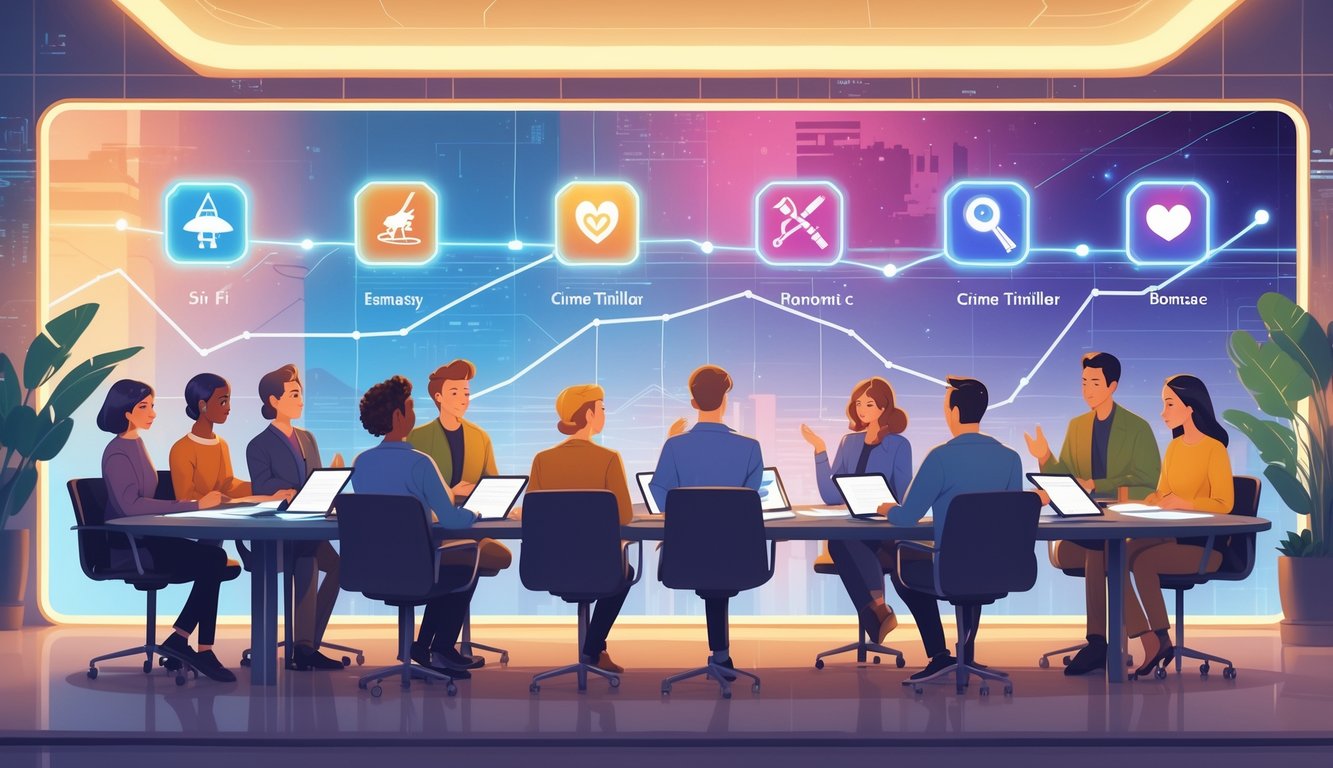
What’s Next: The Evolution of Genre Storytelling
So, what’s next? No one knows. Genres never sit still—ask any TV writer doom-scrolling script notes at 2 a.m. and they’ll say trends are already dead by the time you read about them. Streaming data, algorithms, hybrid stories—whatever you call it, the “genre rules” change faster than I can update Final Draft. Studios chase TikTok micro-trends, audiences skip straight to the weird stuff, and by the time the credits roll, everyone’s already somewhere else.
Predictions for the Coming Decade
Alright, if you’re out here betting on genres snapping back to their “classic” boxes, I don’t know what planet you’re pitching on—because, wow, I watched a bunch of execs practically drool over something pitched as a solarpunk romance-thriller. (Try explaining that to your uncle at Thanksgiving. Or don’t.) Anyway, genre blending isn’t remotely new, but the pace? It’s nuts. PublishingState.com says the fastest-growing stuff is already genre soup—solarpunk, hopepunk, autofiction, all leaking into TV. Apparently, the audience wants comfort and a challenge, not just a nap in front of the screen.
Trying to measure any of this? Good luck. Nielsen’s 2024 numbers—if you trust them, which, eh—showed “genre hybrid” content jumping 17% on minor streaming platforms. Does that mean anything? Studios get to play it safe, but writers? We’re out here guessing which Frankenstein genre (post-apocalyptic comedy? climate-noir-dramedy? whatever) might get a greenlight before the next algorithm update nukes it. I keep hearing people say, “Genres are hashtags now.” They’re not wrong, which is… depressing? Or maybe just inevitable.
The Role of Screenwriters in Shaping the Future
I’ll just say it: everyone blames screenwriters for chasing trends, but we’re the ones losing sleep, shoving weird genre mashups into drafts, hoping some exec will call it “visionary.” I once jammed speculative memoir junk into a sitcom and my agent—who’d barely read it—called it “disruptively authentic.” Is that a genre? I guess, if someone cares. I skimmed Miller and Shepherd’s thing about digital genres and “constellation of affordances”—which, fine, means the lines are gone and you’re lost unless you make your own map.
My advice? Don’t follow trends. Write whatever makes the genre bots glitch. Sometimes it tanks. Sometimes the streamer invents a new category just to shelve you. My friend’s “speculative culinary dramedy” flopped, then got revived because some exec muttered, “Cozy noir vibes.” No one knows anything.
Lessons from 2023 and Beyond
2023—barely remember it. Everyone pretended to “learn lessons” on Zoom, which mostly meant someone made a slideshow about AI scripts and genre models that were supposed to “change everything.” Spoiler: chaos. The biggest streamer hit that fall? A dirt-cheap time travel family sitcom smashed together with retro horror. Made zero sense, but people stuck with it. Guess that’s what genre burnout looks like.
Execs tried copying it. Never works. By 2024, the running joke was, “There’s nothing new, just new label makers.” What the data missed? Audiences want real emotion and weirdness, not some perfect genre checklist. If you want to see the stuff that keeps popping up, here’s the 2025 genre list. Don’t expect anything to last longer than a TikTok trend.
Frequently Asked Questions
Nobody’s begging for another TED Talk here, but wow, genre rules get slippery the second you try to define them—and don’t even bring up executive notes. Writing TV now means constantly crashing into audience whiplash, chasing algorithm mirages, and watching people get nostalgic for eras that were never that great.
How do genre trends influence the writing process for TV shows?
So, I’m staring at my outline, trying to tune into the “zeitgeist,” but do people want moody detective stuff or off-the-wall office comedies? Who knows. Studios beg for a “fresh procedural,” then freak out if you skip the cold open. I heard an exec quote some poll—47% of viewers want “complex genre mashups.” Three weeks later, everyone’s back to comfort sitcoms. I keep five tabs open for genre trend predictions, but honestly, I trust them about as much as I trust a diet soda to fix my sleep schedule.
What insights do TV writers have into the evolution of genre storytelling?
Every writers’ room has that one person reminiscing about when “genre meant something,” but honestly, it’s unraveling in front of us. Everyone talks about the Marvel-ification of TV—like, is every show secretly in the same universe now? Sometimes it feels that way. Barry Diller gets quoted everywhere, tossing out predictions that sound like recycled press releases, but a staff writer I know said genre “rules” are basically haunted IKEA instructions. Accurate.
In what ways do TV writers predict the merging or creation of new genres?
Still annoyed about the time my “cozy science fiction crime mystery dramedy” got blacklisted, then someone else pitched the same thing and got a deal. That’s just how it goes. I keep reading that streaming platforms are about to reward the weird hybrids, like interactive genre-blending TV. I swear, the next big genre is lurking in a spreadsheet, somewhere between “reality dating” and “speculative fiction,” laughing at my pitch deck while drinking overpriced cold brew.
Why do TV writers believe certain genres resonate more with audiences?
Is it a mystery? Sometimes. Sometimes not. You blink and a format nobody pitched goes viral. Nostalgia or whatever hot-button thing bulldozes all the clever subversions. Writers get blamed if it’s “too niche,” even though last year’s ratings say otherwise. I’ve seen execs wax poetic about demographics, wave around Nielsen charts, then axe a slow-burn thriller because “everyone tunes out after minute twelve.” Tastes change. Marketers swear they know, but my old scripts from 2010 suddenly pop up on streaming and I just shrug.
How do TV writers stay ahead of genre shifts to keep content fresh?
I once followed a coworker into an algorithm conference in Vegas—got lost in data dashboards for a week, thought we’d cracked the code. Nope. Now I compulsively refresh audience analytics and scroll #writersroom on Twitch, hoping to spot a trend before it’s a trend. There’s no magic formula. Most writers I know treat breaking genre conventions like a weird hobby fueled by too much caffeine. Not even for the show, just for the thrill of dodging the same-old.
What role does audience feedback play in shaping TV genre trends for writers?
Honestly, I can’t even count how many times I’ve trashed a whole subplot just because some random person on Twitter called it “painfully predictable” at 2 a.m. Like, who are these people, and why do they have so much power over my outline? Sometimes I’ll see a side character get torn apart online and suddenly I’m rewriting their entire personality arc on a Sunday when I should be asleep. And let’s not pretend I’m the only one glued to real-time audience engagement on streaming services—it’s like this weird, chaotic feedback loop. Most of the comments are totally unhinged, but you can’t help but scroll and wonder if that one memeable moment is about to tank your next episode. Is it even possible to ignore the noise? I don’t know. I say I will, but then I never do.



